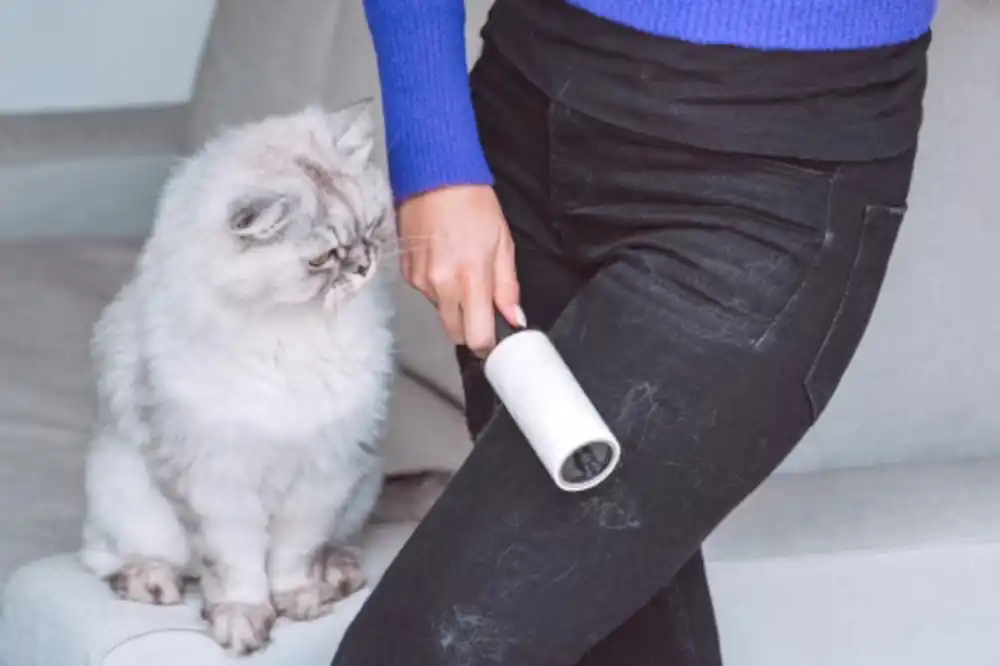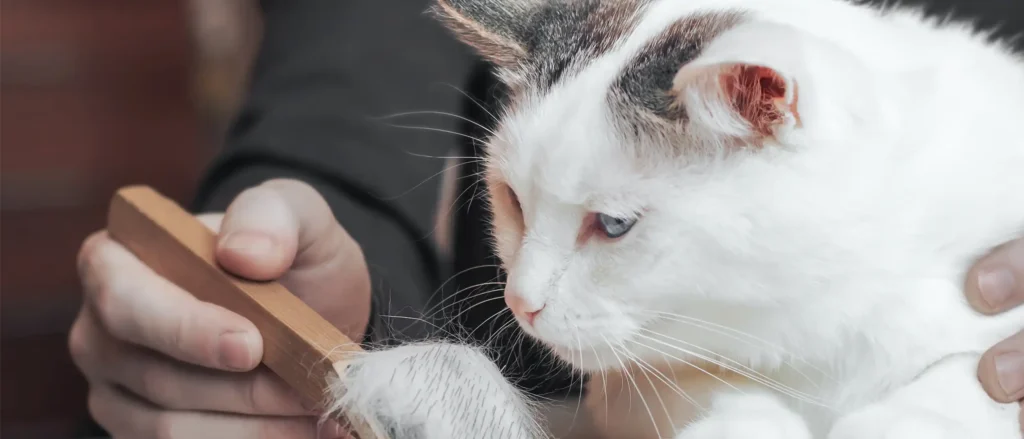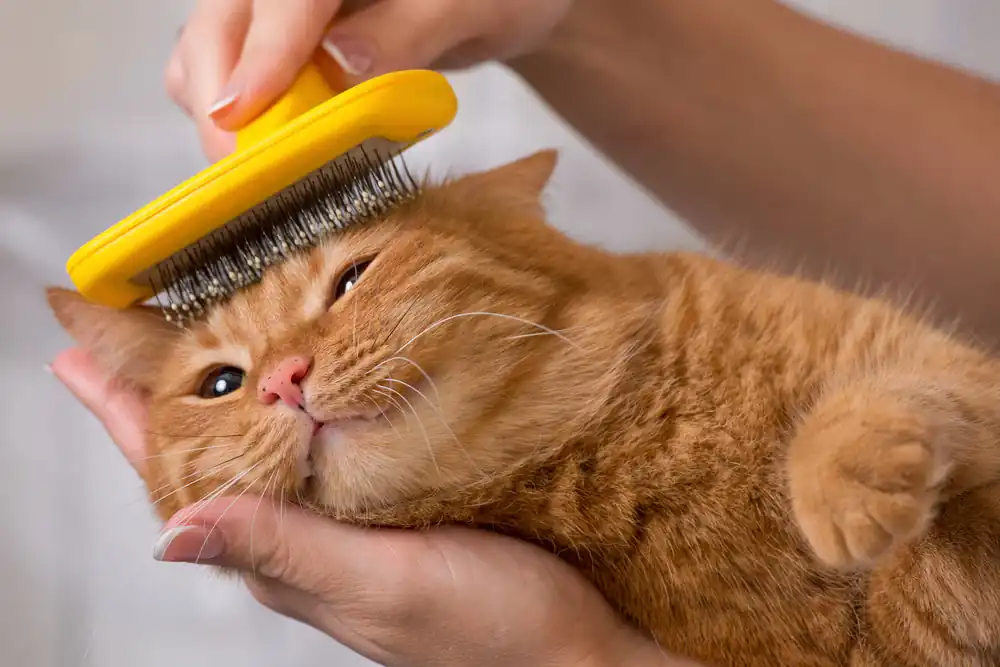Why do cats lose hair?
Every spring and autumn is the molting season for cats. At this time, it is normal for babies in the home to shed a lot of hair. However, if the cat keeps losing hair or even has a bald patch in normal times, it may be a sign of health problems! What should I do if my cat keeps losing hair? Follow the steps of this article to learn about the causes of cat hair loss, how to improve it, and help owners develop soft and rich hair!

Why do cats keep losing hair? Understand the 6 major reasons why cats shed hair
Reason 1: for cats losing hair: Seasonal hair loss
It is very normal for cats to shed their hair seasonally. In order to adapt to changes in temperature, cats will shed a large amount of hair every spring and autumn. This is also an important mechanism for cats to maintain healthy skin and hair. During the cat’s shedding season, the slave can brush the master’s fur more often and feed the cat hair removal cream to prevent the cat from eating too much fur and causing indigestion.
Reason 2: for cats losing hair: eating too much salt
Cats naturally do not need to take in too much salt. Especially many cats have kidney problems. Eating too much salt will increase the burden on the kidneys and cause cats to lose a lot of hair. Novice fur dads must pay special attention to this!
Reason 3: for cats losing hair: Malnutrition
If a cat is malnourished, its hair will become dry, dull, and can easily break and fall off, leading to hair loss. The slave can check whether the cat’s usual food is too single, or supplement with more health foods such as “fish oil” to strengthen the care of the baby’s skin and hair and regain its softness and luster.
The cause of cat hair loss also includes diet. If the cat’s diet does not provide them with the nutrients they need to maintain healthy skin and hair, the cat may start to shed hair or have problems with the hair becoming worse.
Cats require large amounts of protein for their skin and coat to function; approximately 30% of their daily protein intake is used for skin renewal and growth. If there is a lack of high-quality protein in the diet, or protein that is difficult to digest, their hair will become thinner, break easily, and even lose hair.
Vitamins A and E keep your cat’s coat healthy; these vitamins help with cell growth and are natural antioxidants. A lack of these vitamins may result in the cat’s body being unable to produce keratin, the main component of hair.
Reason 4: for cats losing hair: Excessive stress
When cats’ lives and environments change, such as moving or having new family members, they may feel nervous and stressed. When cats are anxious, they will “lick their fur” to divert their attention. Excessive licking will cause the cat to lose hair and become bald.
Reason 5: for cats losing hair: Endocrine disorders
When a cat’s endocrine system is imbalanced, problems such as folliculitis, massive hair loss, and patches of bald hair may occur. It is recommended that you seek the help of a professional veterinarian to treat endocrine problems and improve the health of your skin and hair through daily maintenance and dietary conditioning.
Reasons for cat hair loss 6: Cat ringworm, skin diseases
If the cat keeps scratching, loses a lot of hair, and there are bits and pieces of white flakes on the hair, and even a patch of hair is bald in some places, and the exposed skin is red, swollen, and inflamed, it means that the cat is infected with parasites such as mold and fleas. You must seek medical treatment immediately and strengthen daily maintenance.
My cat is losing hair and is bald. Is this cat ringworm?
Many slaves will be very nervous when they find that their cat has lost hair and is worried that the cat will contract a skin disease. However, it may also be caused by the cat being stressed and licking its fur excessively. Listed below are the characteristics of cat ringworm:

- Itching and discomfort
- Excessive licking
- circular baldness
- Red, swollen, raised skin
- Rough and hard scabs appear on the skin
- A lot of dandruff appears on the hair
- Hair is fragile, tangled, and prone to breakage
If the baby at home has the above symptoms, it is likely that he is infected with parasites and has cat ringworm. It is recommended to seek medical treatment immediately. At the same time, keep the environment clean, eliminate the root causes of parasites, and strengthen the baby’s nutritional intake, so that the skin can be strengthened from the inside out. healthy!
Dermatophyte (commonly known as ringworm) is one of the most common causes of cat hair loss. This fungal infection is highly contagious and often occurs in kittens or cats that live in groups. The main vector of infection is fungal spores, known as Microsporidia, which may be acquired from infected animals or contaminated environments and can remain infective for several months.
The spores can enter your cat’s skin through any bites, scratches or wounds and start the infection in the outermost layer of skin and hair follicles. If the scars on your cat’s skin are in areas that are difficult to groom, such as on the face, the risk of contracting dermatophytes increases because grooming the coat helps remove infectious agents and prevent infection. In addition, if your cat’s immunity is weakened due to illness or medical treatment, it may also appear symptoms of ringworm, leading to severe hair loss.
Symptoms of dermatophyte infection can vary greatly from cat to cat, but you may notice a patch of hair loss, consisting of irregular or rounded patches of hair loss, along with red patches of flaking skin. They may also be prone to hair loss or behave abnormally.
Typically, feline fungal hair loss can be completely cured, but the process of treating the infection itself does require several stages, including eradicating any remaining spores, applying cat ringworm ointment, and thoroughly disinfecting the environment in which your cat lives. Skin mold is also highly contagious to family members, so if you notice any symptoms in your cat, be sure to consult a veterinarian as soon as possible to prevent the infection from spreading further and turning into cat ringworm in adults.
How to improve cats’ severe hair loss? Learn the 4 key points of cat hair care
In addition to pathological hair loss (endocrine disorders, cat ringworm problems) that require immediate medical attention, how should the slave take care of the baby’s hair in daily life? The following is a summary of 4 daily maintenance points to help cats say goodbye to their fragile hair:

- Comb your cat’s hair every day
Grooming your cat’s hair every day can not only collect waste hair and prevent the cat from eating too much hair, but also make the hair healthier and shiny. Once a cat falls in love with the feeling of grooming, it will even take the initiative to come to you for grooming, which will increase the time you spend together and enhance your relationship!
- Wash your cat fragrance regularly
Although cats will lick and bathe themselves, you still need to give your cat a fragrant bath regularly to remove excess oil and dirt from the skin and hair to maintain the health of the skin and hair. It is recommended that cats should be bathed at intervals of more than 2 months, but not too frequently. It is also recommended to use cat-specific shampoo to strengthen cleaning and protect the health of the cat’s hair.
- Relieve stress and relax at the right time
When a cat is too stressed, it will have anxiety reactions such as excessive licking, causing the cat to lose hair and become bald. First of all, the cat’s stress source must be solved, and the cat should be accompanied and played with to soothe the baby’s nervousness. In addition, you can also give the cat some catnip and catnip in a timely manner to help the cat relieve stress.
- Get key nutrients for hair
In addition to a balanced intake of nutrients, you can also supplement the nutrients needed for hair through health foods. For example, “fish oil” is rich in Omega-3, DHA, and EPA, which can effectively enhance the cat’s immunity and strengthen the skin barrier, thereby improving hair loss and hair loss. Allergic reactions, while also improving the gloss of the hair, creating healthy and beautiful hair for cats!
